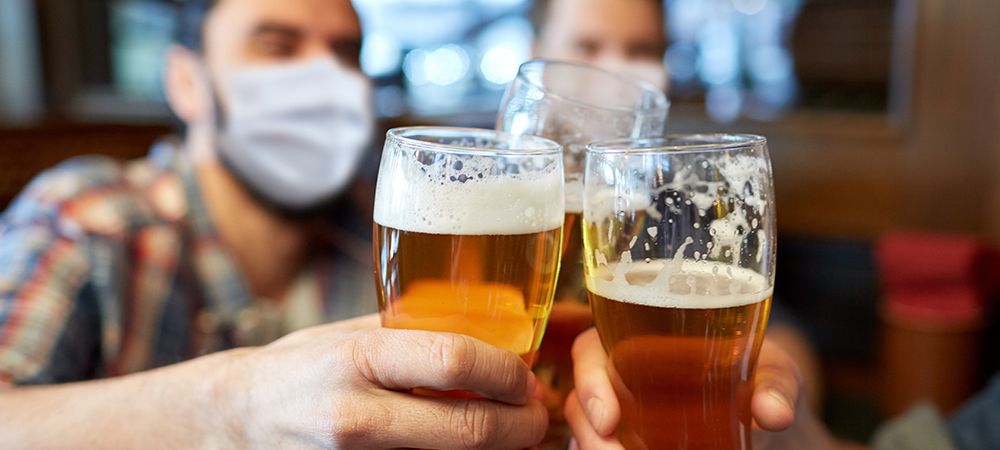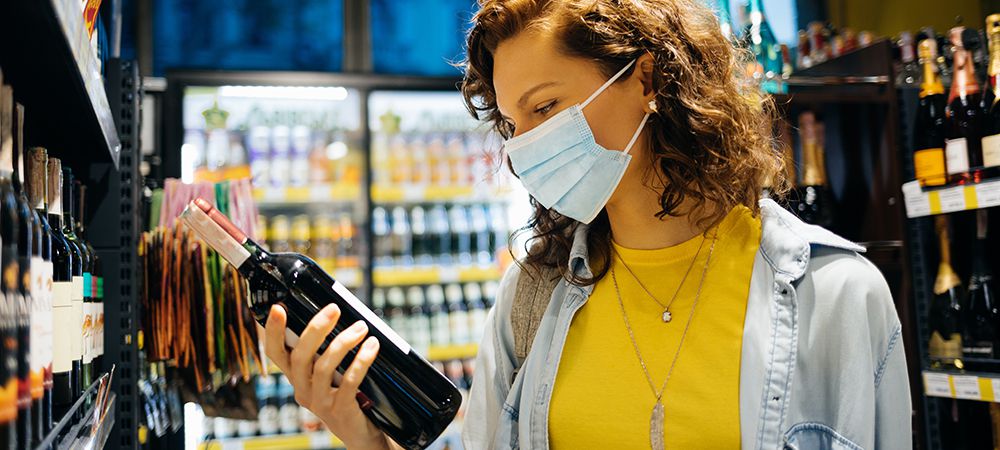
Have Canadians Been Drinking More Alcohol During The Pandemic?
The COVID-19 pandemic has changed many aspects of our daily lives. Our lives pre-pandemic were governed by things like our daily commute and our interactions with people. In COVID-19 times, we are having to plan our lives around lockdowns and restrictions. We are working from home, attending school remotely, and shopping online. Even our healthcare has largely gone virtual, with appointments with doctors and therapists taking place over the phone or via Zoom.
Our daily routines have been turned upside down. Instead of rushing out the door, we are setting our kids up for online classes before settling down in our own hastily assembled home office spaces. Gatherings with friends take place via a computer screen. We cannot go to the gym, so we make do with workouts in our living rooms and walks around the block.
Our consumption of foods and beverages has also changed. A phrase that people have been increasingly using is “pandemic pounds” – the weight gain associated with eating less healthily as a result of being stuck at home. Many of us resort to takeout or microwave meals because we’re tired of constantly cooking for family members who, unlike the “before” times, are home 24/7.
Has this change in consumption extended to alcohol? Are Canadians drinking more wine, beer and spirits as a result of the COVID-19 pandemic?
To answer this question, let’s first take a quick look at what “typical” alcohol consumption looks like in Canada.
Typical Alcohol Consumption In Canada
Alcohol is by far the most used and abused substance in Canada. During pre-COVID times, around 77% of Canadians consumed alcohol at least once in a one-year period. At 83%, the highest rate of alcohol use was among young adults aged 20-24. 78% of people aged 25 and older reported alcohol use, and in a troubling trend, 59% of youth aged 15-19 were using alcohol.
Although there has been some variance from one year to the next, these numbers have been relatively stable over the last decade.
Has The Pandemic Changed Alcohol Consumption In Canada?
According to a Statistics Canada survey done in January 2021, 54% of Canadians who consumed alcohol prior to the pandemic have not changed their drinking habits. The remaining number is split roughly evenly between those who have increased their alcohol consumption and those who are drinking less.
When we break down the change in alcohol drinking habits by age, an interesting picture emerges. While increases in alcohol consumption have occurred fairly uniformly across age groups, teens and young adults (ages 15-29) have decreased their consumption at much higher rates than older people.
Another thing that seems apparent is that the pandemic has produced more heavy drinkers. Prior to 2020, 11% of Canadians had at least five drinks on the days they consumed alcohol. By January 2021, this number increased to 18%.
Why The Changes In Alcohol Consumption?
Human beings are creatures of habit. Even the more adventurous people among us like to have some semblance of order: sleeping at certain times of the day, following some kind of work schedule, buying groceries from a favourite location.
When any singular element of someone’s daily routine changes, other things have to change to accommodate it. If you get a new job, you have to change your morning commute. If you take up exercise, you may have to get up earlier to get to the gym. If you get a dog, you have to buy dog food and set aside time for daily walks.
For most people, alcohol consumption is just part of that daily routine, and it is one of the things that can vary depending on the changes that are going on in one’s life. It is not surprising that for almost half of the Canadian population, the massive routine changes that have come with the pandemic have led to different drinking habits.
Why Are Some People Drinking More During The Pandemic?
Any change – even a positive one – is stressful, and the COVID-19 pandemic has resulted in complete changes to many people’s lives. According to an April 2020 report by the Canadian Centre on Substance Use and Addiction, 94% of Canadians reported that they were staying home more as a result of the pandemic. Major routine changes experienced by many include:
- Working from home
- Supervising school-aged children who are learning remotely
- Reductions in exercise due to fitness centres and pools being closed
- Shopping for groceries online
- Eliminating social gatherings
- Reducing or eliminating travel
- Spending more time on household chores as a result of everyone being home at all times
The top three reported reasons for increased alcohol consumption are:
- Lack of a regular schedule resulting from the above-mentioned disruptions
- Boredom resulting from lack of social interaction
- Stress resulting from all of the changes plus anxiety about the pandemic itself
Other reasons cited include loneliness and online social gatherings.
Why Are Some People Drinking Less During The Pandemic?
Drinking alcohol is closely linked with social gatherings, especially among younger adults who are more likely to drink alcohol only when they with other people. This could go a long way to explaining why younger adults have cut back on alcohol consumption far more than older people. The lack of opportunities to socialize is by far the number one reason for decreased alcohol consumption.
Other reasons include wanting to be healthy to reduce COVID risks, caring for dependents, and trying to regain health after having had COVID-19.
Alcohol Sales As An Essential Service
Throughout the pandemic, the sale of alcohol has been regarded as an essential service in most parts of Canada, including Ontario. Many people have questioned why this is the case. On the face of it, there do appear to be arguments in favour of limiting alcohol sales.
Some countries have taken this approach. In South Africa, for instance, alcohol sales have been banned outright during the most severe phases of lockdown. Two factors have driven this decision: the concern about alcohol-fueled domestic violence incidents while lockdowns make escape difficult for the victims, and the goal of keeping alcohol-related trauma cases out of hospitals that need space for COVID patients.
There is a dangerous risk to this approach, though: by cutting off access to alcohol, we run the risk of everyone with an alcohol addiction going into withdrawal at the same time. Alcohol withdrawal without medical supervision can be extremely harmful – in some cases, fatal. For someone who is addicted, alcohol sales are indeed essential.
It is reasonable to believe that most jurisdictions worldwide responded to the pandemic as best they could with the information and resources available to them. A lesson learned could be that access to alcohol should be balanced with mental health services for people with addictions, and social services for those who are victims or at risk of becoming victims of alcohol-induced crimes. These services should be available to anyone who needs them, regardless of whether there is a global health crisis. If anything, the COVID-19 pandemic has done a great job of highlighting areas where these services are lacking.
Why Is The Data Important?
There are those who would argue that these statistics are “just numbers”, and that alcohol addiction is a serious issue regardless of what is going on in the world. And yes, it is true that help needs to be accessible to anyone who needs it, but by having an understanding of the impacts of a major event like a pandemic, policy makers and service providers can create targeted programs and awareness campaigns.
The world was not prepared for the COVID-19 pandemic: by taking the learning from this experience, programs and response plans can be put in place for any future crises that may arise on a local, national or global scale.
Getting Help For Alcohol Abuse & Addiction
If you think you have a problem with alcohol abuse or addiction – whether it is related to the pandemic or not – it is never too soon or too late to get help. At 1000 Islands Addiction Centre, we will provide medical supervision to enable you to detox safely, and then we will put together a customized alcohol addiction and recovery program that is right for you. Contact us without delay so that you can reclaim your life.



